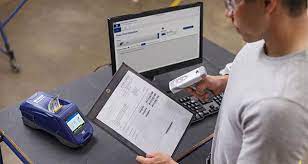In today’s fast-paced world, accuracy is more critical than ever. For businesses that rely on inventory management and data collection, accuracy can mean the difference between success and failure. Barcode scanners have become a popular tool for inventory management and data collection, but some businesses still rely on manual data entry. In this article, we will explore the differences between barcode scanners and manual data entry and why accuracy matters.
Barcode Scanners
Barcode scanners use technology to read and decode barcodes on products, allowing businesses to track inventory levels, monitor sales, and manage supply chain operations. Barcode scanners have become an essential tool for businesses that want to streamline their operations and increase accuracy.
The Benefits of Barcode Scanners
Barcode scanners offer several benefits over manual data entry, including:
- Speed: Barcode scanners can read barcodes in a matter of seconds, while manual data entry can take minutes or even hours.
- Accuracy: Barcode scanners are incredibly accurate, with error rates as low as 0.1%. Manual data entry, on the other hand, is prone to errors due to factors such as fatigue, distractions, and typos.
- Efficiency: Barcode scanners automate the data collection process, reducing the time and resources required for manual data entry and reconciliation.
Manual Data Entry
Manual data entry involves entering data into a computer system by typing it in manually. While manual data entry has been used for decades, it is becoming less common as businesses turn to barcode scanners and other automated data collection tools.
The Risks of Manual Data Entry
Manual data entry poses several risks, including:
- Errors: Manual data entry is prone to errors due to factors such as fatigue, distractions, and typos. These errors can have significant consequences for businesses, such as incorrect inventory counts and mispriced products.
- Time-consuming: Manual data entry is a time-consuming process that requires employees to spend hours typing in data.
- Inefficiency: Manual data entry is an inefficient process that can result in delays and errors.
Why Accuracy Matters
Accuracy is critical for businesses that rely on inventory management and data collection. Inaccurate data can lead to incorrect inventory counts, mispriced products, and lost sales. Barcode scanners offer a high level of accuracy, reducing the risk of errors and improving the efficiency and effectiveness of businesses.
Conclusion
Barcode scanners offer significant advantages over manual data entry, including speed, accuracy, and efficiency. Manual data entry is a time-consuming and error-prone process that can have significant consequences for businesses. By investing in barcode scanners and other automated data collection tools, businesses can increase accuracy, streamline operations, and maintain a competitive edge in today’s market.








